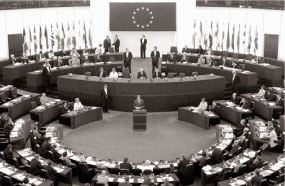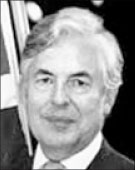|
The ‘tragedy of peace’ from a tendentious report:
E uropean
Parliament rejects moves for Int’l probe on Sri Lanka uropean
Parliament rejects moves for Int’l probe on Sri Lanka
“It is a far cry from the reality and was heavy on criticism but
light in substance,” was the most telling comment on the Darusman Report
made by Dr. Charles Tannock, UK - MEP) as he spoke on the ‘Urgency
Debate’ in the European Parliament (Thursday 13), which defeated an
attempt by the Socialist group ‘to seek the immediate establishment of
an international justice mechanism’ on Sri Lanka. He was speaking
against a move by the Socialist and Green Parties at the Strassbourg
Plenary of the European Parliament to draw attention to the so-called
‘UN Panel Report’ on accountability issues in Sri Lanka, during the last
phase of the operation against terrorism in the country.
|

Dr. Charles Tannock |
Dr. Tannock, representing the European Conservatives, went further to
state that: “Sri Lanka has finally achieved peace by defeating a
ruthless terrorist organization - LTTE which rejected all the peace bids
made by the government”. He said “the term ‘Genocide’ is being mentioned
by some even without the knowledge of its meaning”. Questioning the
arguments made by the Socialists and Greens, Dr. Tannock asked “how any
one could accuse the Sri Lanka Army for genocide or crimes against
humanity when the same Army rescued more than 200,000 Tamil civilians
from the LTTE and have now helped re-settle most of them”.
The rejection by the European Parliament of the move to seek the
immediate establishment of an international justice mechanism on Sri
Lanka is a major success of the government’s move to present to the
world the truth about the defeat of the LTTE, and exposing the efforts
of the pro-LTTE lobbyists, especially in the West, who used the Office
of the UN Secretary General and the highly contentious Darusman Report,
to attack Sri Lanka through allegation of war crimes and violations of
humanitarian law, in the final phase of the defeat of LTTE terror.
President’s forceful counter
It is significant that this defeat of the move to have an
international probe on Sri Lanka came soon after President Mahinda
Rajapaksa made it very clear that although Sri Lanka did not accept the
validity of the Darusman Report, the government would be forceful in
countering the many false charges the report makes against the country,
its armed forces and the success of the humanitarian operation to defeat
the LTTE and its terror.
|

European Parliament session. Pic. courtesy: Google |
In his interaction with editors of the print and electronic media
last Tuesday, President Rajapaksa stated this position with emphasis and
focus on core issues that seemed lacking earlier in official reactions
to the Darusman Panel and its report, whether to diplomats or in other
official statements.
Describing the Darusman Report as a tendentious document that makes
grossly false allegations about Sri Lanka and its security forces, the
President said the government will defend the good name of the country
and expose the false allegations that are abundant in this report. He
emphasized that although there were questions about the validity of the
panel that prepared this report, Sri Lanka would not take it lightly
because it is necessary to expose the abundance of false allegations
made, and it is the responsibility of government to safeguard the good
name and the image of the country.
Responding to questions the President said the report was admittedly
a narrative of unsubstantiated statements and not a record of any
verified or authenticated facts. He said there was an abundance of
evidence available through very reliable sources within the UN and
several international agencies that were associated with the government
in carrying out humanitarian operation to eradicate terrorism. All of
this will be made available to all concerned.
The suspicion that Thursday’s debate in the European Parliament was
promoted by extremists elements in the ‘Tamil Diaspora’ who see in the
Darusman Report a weapon in their campaign against Sri Lanka, was stated
very clearly by Geoffrey Van Orden (The European Conservatives and
Reformists/UK) who said, “I regret that we are having this debate today.
I suspect that it has been promoted by extremist elements in the Tamil
Diaspora - the same people who have helped to sustain the LTTE terrorist
campaign over many years through political activity and funding, often
from the proceeds of crime. Instead of trying to bring together the
peoples of Sri Lanka, there are those that seek to continue a campaign
of hatred and division. They see this Darusman Report as a weapon in
this campaign and just want to put the Sri Lankan government in the
dock. This approach is malicious and counter-productive”.
Sri Lankan responsibility
He added: “Of course there should be an enquiry and openness
regarding allegations of human rights abuse. This is the responsibility
of the Sri Lankan government which has set up an eight-member Lessons
Learned and Reconciliation Commission (LLRC) with the aim of ensuring
accountability and justice. I believe that its work would be
strengthened enormously with international input and it needs to take
serious account of the UN’s Darusman Report. Let us do all that we can
to support the government and people of Sri Lanka instead of attacking
them”. He urged the European Parliament “to remain vigilant concerning
those that seek to reignite the embers of LTTE terrorism. I call on the
EU and European governments to be more active in dealing with extremists
in our midst”.
|

Thomas Mann |
Also participating in the debate, German MEP Thomas Mann of the
Majority European Peoples Party (EPP), said in February 2011 he “was in
Sri Lanka as a member of the South Asian Delegation and saw just how
much effort was being made to progressively deal with the post conflict
issues like removing land mines and facilitating displaced people to
return to their homes. The government’s readiness to cooperate, desire
to integrate minorities and assure proper democratic and human rights
standards implies that there will be a valid future for this country”.
The tragedy of peace
“The war in Sri Lanka ended tragically, amidst controversy.” This is
how the Darusman Report begins. Even the most cursory reading of this
report would show that the tragedy it refers to was for the LTTE and its
supporters who are still throwing the weight of their funds and
constituency strength in several Western countries. The report goes on
to state that: “Many Sri Lankans and others around the world were
relieved that the Liberation Tigers of Tamil Eelam (LTTE) renowned for
its brutality, was defeated and that 27 years of armed conflict had come
to an end. However, many people in Sri Lanka and elsewhere were deeply
disturbed about the means used to achieve the victory by the country’s
armed forces.” (Para 1) It is interesting to note that the Darusman
Panellists regarded the LTTE as ‘renowned’ and not ‘noted’. From the
outset the panel seeks to bring some glory to the LTTE, although
compelled to record its terrorism that saw this conflict being drawn for
nearly three decades of tragic bloodshed. For the panellists the tragedy
was peace itself, and the relief in Sri Lanka and others around the
world that the LTTE was finally defeated. It is not easy to take such
observations as being objective, whether they are in recommendations to
the UNSG or any others. The tendentious nature of the report is thus
made obvious from the outset.
In para 31, the report that has fast become the new Bible of the
anti-Sri Lanka lobby, states: The LTTE began as a Tamil liberation
movement and eventually became the most disciplined and nationalist of
the Tamil militant groups, emerging as the dominant force espousing a
separatist agenda in the mid-1980s”. It admits that the LTTE adopted
increasingly violent tactics to silence other Tamil groups, and enforce
the thinking of Velupillai Prabhakaran on all Tamils and others,
|

Geoffrey Van Orden |
too. The issues of it being the ‘most disciplined’ and ‘most
nationalist’ of the Tamil militant groups raise many questions. If
discipline of any type is considered a virtue, then the Darusman
Committee has made its point very well. As for being the ‘most
nationalist’, one wonders whether any Tamil group that went on the
rampage against its own people, to hold them in its thrall for so long,
until being liberated by the Sri Lankan troops that it fought for three
decades, could be termed even mildly nationalist, rather than extremist.
The world is not without examples of other such highly ‘disciplined’
and ‘nationalist’ groups. The quickest example is the Nazi forces of
Adolf Hitler. There is no doubt about their high level of discipline,
which saw almost the entirety of Europe come under the Nazi jackboot in
a very short time. As for their nationalism, the Nazis had a very high
commitment to demonstrating German Nationalism that had been distorted
to the Nazi dogma of the racial supremacy of the Aryans. It was a high
level of discipline and nationalism - of the Aryan racist variety - that
saw the holocaust of Jews, and the systematic and highly efficient
methods of seeking to wipe out the Roma and Gypsies and others too.
The Panel (para 53) states it “has chosen to present the allegations
it finds credible in a narrative account rather than listing the various
allegations under their legal classification, so as to provide a greater
sense of context and perspective. This account should not be taken as
proved facts, and any effort to determine specific liabilities would
require a higher threshold.”
It is certainly interesting to see the Darusman Panel admit to its
attempt at story telling, without recourse to the truth, in stating that
what it presents is a narrative that does not list various allegations
under their legal classifications. There are stories and narratives of
many types, from fairy tales to the best and worst of novels. There are
tales that are passed down by word of mouth and legends that continue to
captivate the minds of people without an iota of truth established by
research. What the Darusman Report is admitting to doing is presenting a
gory story to the world, which has not gone through the test of
verification or authentication. Its admission of requiring a higher
threshold to determine specific liabilities is the most damning comment
it makes of its own work, done at such speed, and with the least
importance to verification of the truth.
It is hardly surprising that the European Parliament had thought it
fit to reject any move to call for an international probe into the many
allegations on Sri Lanka, based on such a narrative that lacks in basics
of accountability about its own findings. |



